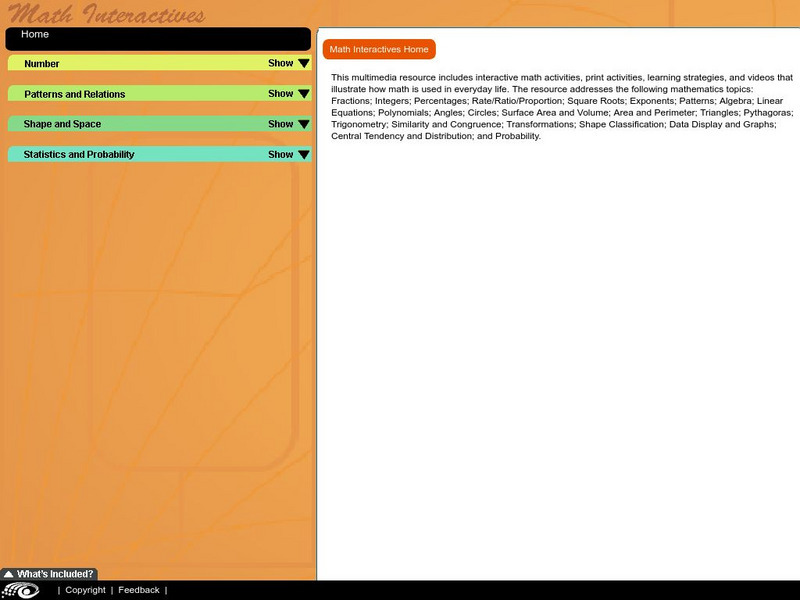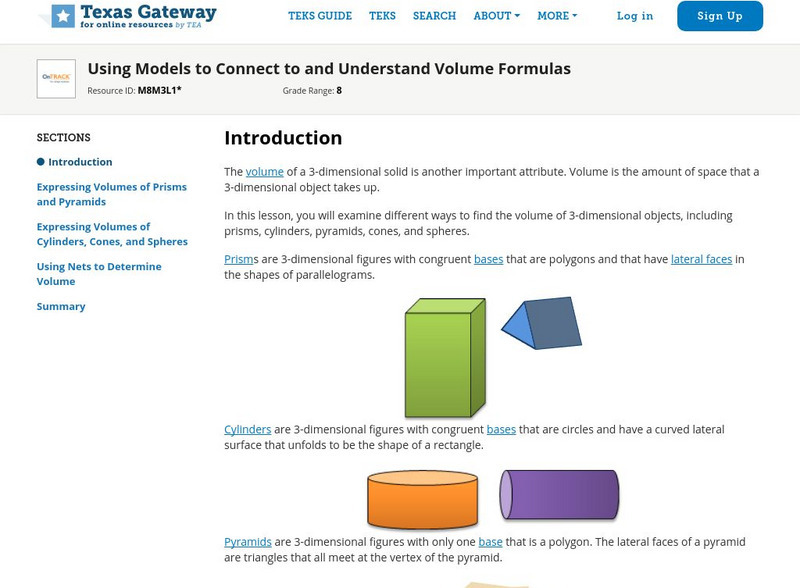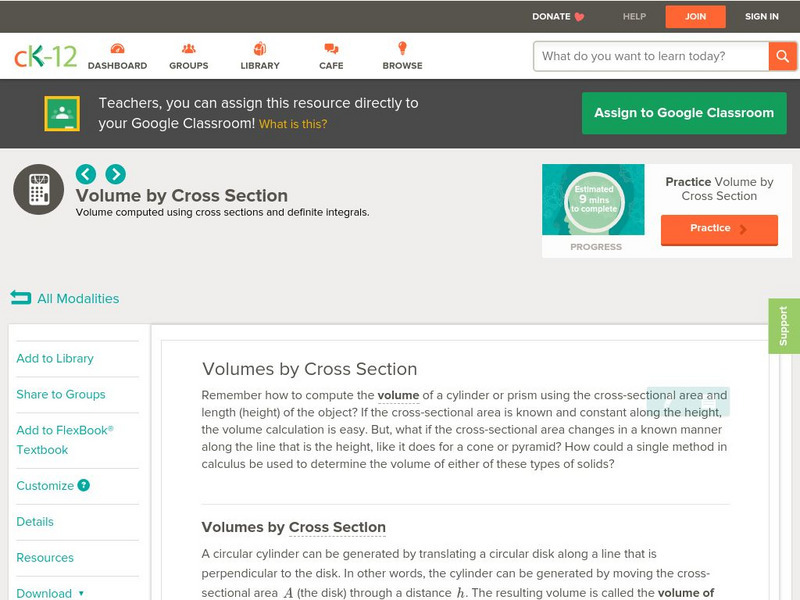Curated OER
Using Concept Maps to Design 3D Spheres
Students create three dimensional shapes using concept maps. In this geometry lesson, students investigate the impact of mental schemas on humans. They collect data on this topic and plot their data on a coordinate plane.
Curated OER
Cones, Cylinders, Spheres
Students classify polygons by name and shape. In this geometry instructional activity, students identify the lateral surface of each conic. They differentiate between cones, cylinders and spheres.
Curated OER
Finding the Area Under A Curve with Random Probability
Students explore the concept of area under a curve. In this area under a curve lesson, students find the area under a curve using the Monte Carlo method using random points and probability. Students calculate the area under the same...
Curated OER
Rep Tiles
Third graders use pattern blocks of one shape at a time to try to create a similar shape. They compare the perimeter of the new figure with the perimeter of the original shape and look for a pattern. Students use the pattern to predict...
Curated OER
Measurements
Seventh graders solve word problems involving real world situation. In this geometry instructional activity, 7th graders solve problems related to volume. They apply the formulas taught in geometry.
Curated OER
Using Nets to Find Surface Area
Eighth graders explore three-dimensional objects (prisms, pyramids, cylinders and cones) to draw nets. They use the understanding of drawing nets to find the surface area of pyramids and cylinders.
Curated OER
Examining Geometric Solids
Young scholars explore geometry by completing a math worksheet in class. In this shape identification lesson, students identify the characteristics associated with 15 solid geometric shapes. Young scholars identify patterns between...
Curated OER
ndirect Measurement Technique: Using Trigonometric Ratios
Ninth graders find the height of an object that would be difficult or impossible to measure directly. They construct and use a Clinometer to measure the angle of elevation (or depression). Students create a sketch of the measurement...
Texas Education Agency
Texas Gateway: Determining the Volume of Prisms and Pyramids
Given a problem involving prisms or pyramids, the student will find the volume using appropriate units of measure.
Other
Tap Into Teen Minds: Prisms and Pyramids
A detailed set of tasks for investigating the volume of prisms and pyramids.
Texas Education Agency
Texas Gateway: Estimating and Solving for Volume of Pyramids
[Accessible by TX Educators. Free Registration/Login Required] Learn how to calculate the volume of a pyramid and how this compares to the volume of a prism. Then solve problems about the volume of rectangular and triangular pyramids....
Better Lesson
Better Lesson: Prism or Pyramid?
Sixth graders explore the faces, bases, edges, and vertices of prisms and pyramids to help develop the concepts of volume and surface area.
Texas Education Agency
Texas Gateway: Determining the Surface Area and Volume of Composite Figures
Given a problem involving composite figures made from prisms, pyramids, spheres, cones, and/or cylinders, the student will find the surface area and volume of the composite figure.
Khan Academy
Khan Academy: Volume Formulas Review
Review the formulas for the volume of prisms, cylinders, pyramids, cones, and spheres.
Government of Alberta
Learn Alberta: Math Interactives: Exploring Surface Area, Volume, and Nets
Investigate the concepts of area, volume, 3D shapes, and nets using this interactive Learn Alberta math. The solid shapes focused on this exploration include rectangular and triangular prisms, rectangular and triangular pyramids,...
Math Planet
Math Planet: Surface Area and Volume of Pyramids, Prisms, Cylinders, and Cones
Explanation of surface area and the volume of pyramids, prisms, cylinders, and cones through examples and a video lesson. [1:44]
University of Regina (Canada)
University of Regina: Math Central: Surface Area to Volume Ratio
Students will investigate the relationship between surface area and volume and their application to the inner workings of real life organisms.
Texas Education Agency
Texas Gateway: Using Models to Connect to and Understand Volume Formulas
[Accessible by TX Educators. Free Registration/Login Required] The student will use models to develop formulas and connect them to the volume of prisms, spheres, cylinders, pyramids, and cones.
Texas Education Agency
Texas Gateway: Using Models to Connect to and Understand Volume Formulas
[Accessible by TX Educators. Free Registration/Login Required] The student will use models to develop formulas and connect them to the volume of prisms, spheres, cylinders, pyramids, and cones.
CK-12 Foundation
Ck 12: Calculus: Volume by Cross Section
[Free Registration/Login may be required to access all resource tools.] This tutorial explains how to calculate the volume of various solids using the 'slicing' method and then deriving a formula for each solid. It goes on to discuss...
Math Open Reference
Math Open Reference: Volume of a Pyramid
Use this interactive tool to find the volume of a pyramid. Try different figures for the height and the base to see how these affect the volume. Properties of pyramids are explained, how to calculate the volume using a formula, what an...
Math Open Reference
Math Open Reference: Volume of a Pyramid
Learn about the volume of a pyramid with this helpful reference tool. Provides a detailed definition, examples, and an interactive activity that enhances further explanation. Includes links to related topics.
Other
Calculator.net: Volume Calculator
Use these calculator tools to find the volume, in your choice of units, of a sphere, cone, cube, cylinder, rectangular prism, capsule, ball cap, conical frustum, ellipsoid, or square pyramid. Includes a reference section listing formulas...
Sophia Learning
Sophia: Volume of Composite Figures: Lesson 5
This lesson will present how to apply the volume formulas of prisms, cylinders, pyramids, cones, spheres, and hemispheres to find the volume of composite figures. It is 5 of 6 in the series titled "Volume of Composite Figures."




















